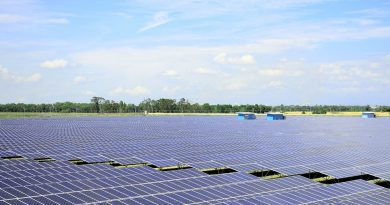The amount of electricity generated by gas and coal tumbled by 20% last year, according to new analysis by Carbon Brief.
The drop means the last time the UK used such little gas and coal was 1957, when the Beatles’ John Lennon and Paul McCartney had just met for the first time.
Back then, the population was 51 million – compared with roughly 67 million now – and fossil fuels still supplied 97% of the UK’s electricity.
The nation’s electricity generation from fossil fuels then peaked at 303TWh in 2008, falling to 104TWh in 2023 – the same level as in 1957.
That’s why fossil fuels delivered a record low share of electricity in 2023 at 33%, the science and policy website said.
Renewables provided 43% of electricity last year, and nuclear 13%.
Carbon Brief attributed the fall from the peak to a rapid scale of wind power, as well as solar and contentious bioenergy, and a reduction in demand.
The falling electricity demand is down to a combination of more efficient appliances and lighting, high prices driven by expensive gas, and changes to a “service-led rather than manufacturing-heavy economy”, it said.
It added demand is expected to rise again as petrol and diesel cars and gas boilers are increasingly replaced by electric vehicles and heat pumps.
But David Whitehouse, CEO of industry body Offshore Energies UK, said electricity is “just one part of the UK’s overall energy picture – we mustn’t forget the UK still gets 75% of its overall energy mix from oil and gas”.
That includes the 85% of homes with gas boilers and 38 million vehicles that run on petrol or diesel, he said.
Jess Ralston, from energy and climate thinktank ECIU, said the switch from fossil fuels to renewables is “a global, not just UK, phenomenon”.
The UK shift was accelerated by renewables “undercutting coal and gas simply on price” – supported by “strong government policy”, she said, and by the gas crisis sparked by Russia’s invasion of Ukraine.
But the UK has “missed opportunities”, she added.
“Onshore wind is one of the cheapest sources of power, but despite promises from government, the de facto ban still hasn’t properly been lifted.”
She warned issues connecting new clean projects to the grid also needed resolving.
A spokesperson for the department for energy security and net zero (DESNZ) said: “We are committed to meeting our net zero targets and continue to lead the world in cutting emissions.
“This has been supported by our first public investment in nuclear power for more than three decades, alongside a 500 per cent increase in renewable electricity capacity since 2010, and driving the biggest reform to our grid since the 1950s – speeding up grid connections, supporting thousands of jobs and reducing bills in the long-term for families.
“We continue to back the UK’s oil and gas industry as it underpins our energy security, supports up to 200,000 jobs, and will unlock billions in tax revenue over the next five years to support the transition to net zero.”
They said updates to the National Planning Policy Framework could speed up onshore wind projects if there is local support, but would take time to come into effect.






